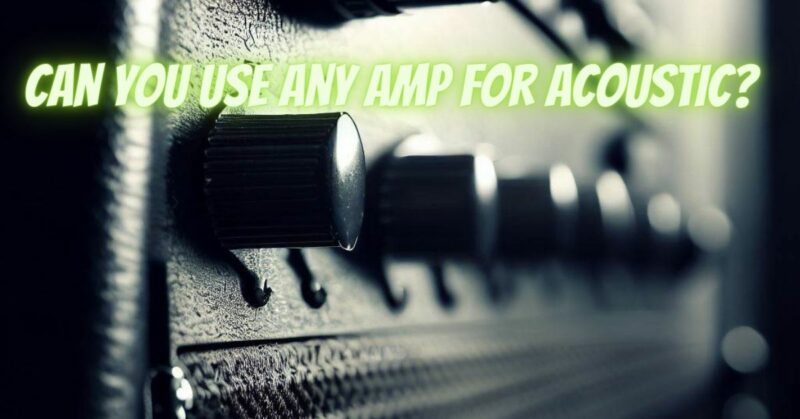The world of acoustic instruments is rich with tonal nuances and expressive melodies that resonate with audiences across genres. When seeking to amplify the natural beauty of acoustic instruments, the question arises: can you use any amplifier for acoustic instruments? This article delves into the compatibility considerations, advantages, and potential challenges of using different types of amplifiers to amplify the captivating sound of acoustic instruments.
Understanding Acoustic Instruments:
Acoustic instruments, whether guitars, violins, or other stringed instruments, possess a unique timbre characterized by rich harmonics and organic resonance. Capturing and amplifying these qualities accurately is essential for maintaining the instrument’s authenticity.
Using Different Types of Amplifiers with Acoustic Instruments:
- Electric Guitar Amplifiers:
- Compatibility: Electric guitar amplifiers are optimized for electric guitars and may not effectively reproduce the true tones of acoustic instruments.
- Considerations: Electric guitar amps might lack the tonal shaping and clarity needed to preserve the subtleties of acoustic sound.
- Acoustic Amplifiers:
- Compatibility: Acoustic amplifiers are purpose-built for amplifying acoustic instruments and vocals, making them the optimal choice.
- Benefits: Acoustic amps offer accurate sound reproduction, tailored EQ settings, anti-feedback features, and often include effects designed for acoustic instruments.
- PA (Public Address) Amplifiers:
- Compatibility: PA amplifiers are commonly used for live sound reinforcement. They can be suitable for acoustic instruments, especially in a live performance context.
- Considerations: Ensure the PA amplifier has appropriate input options and the ability to capture the nuances of acoustic instruments.
- Hi-Fi Stereo Amplifiers:
- Compatibility: Hi-Fi stereo amplifiers can be used to amplify acoustic instruments, especially in home environments.
- Considerations: Check the power output and tonal characteristics of the amplifier to ensure it complements the acoustic instrument’s sound.
Benefits of Using Purpose-Built Amplifiers for Acoustic Instruments:
- Natural Sound Reproduction: Amplifiers designed for acoustic instruments prioritize natural sound reproduction, capturing the intricate nuances of acoustic tones.
- Tonal Control: Acoustic amplifiers often come equipped with EQ controls specifically tailored for acoustic instruments, allowing you to shape the sound to your preference.
- Anti-Feedback Technology: Many acoustic amplifiers feature anti-feedback technology, reducing the risk of unwanted feedback during performances.
- Portability: Purpose-built acoustic amplifiers are often lightweight and portable, making them suitable for both practice sessions and live performances.
Considerations for Optimal Performance:
- Matching Impedance: Ensure that the amplifier’s impedance matches that of the acoustic instrument to ensure efficient power transfer.
- Power Output: Verify that the amplifier provides enough power to effectively amplify the acoustic instrument without overpowering it.
- Tonality: Adjust the amplifier’s EQ settings to enhance the natural qualities of the acoustic instrument and maintain tonal balance.
- Feedback Prevention: Familiarize yourself with the anti-feedback features of the amplifier and use them effectively to minimize unwanted resonance.
While it’s possible to use different types of amplifiers to amplify acoustic instruments, the most authentic and sonically pleasing results are achieved by using purpose-built acoustic amplifiers. These amplifiers are tailored to reproduce the intricate nuances of acoustic sound, offering specialized tonal controls and features that enhance the instrument’s resonance. By selecting an amplifier that complements the inherent qualities of acoustic instruments, you ensure that your performances resonate with the true essence and beauty of acoustic music


